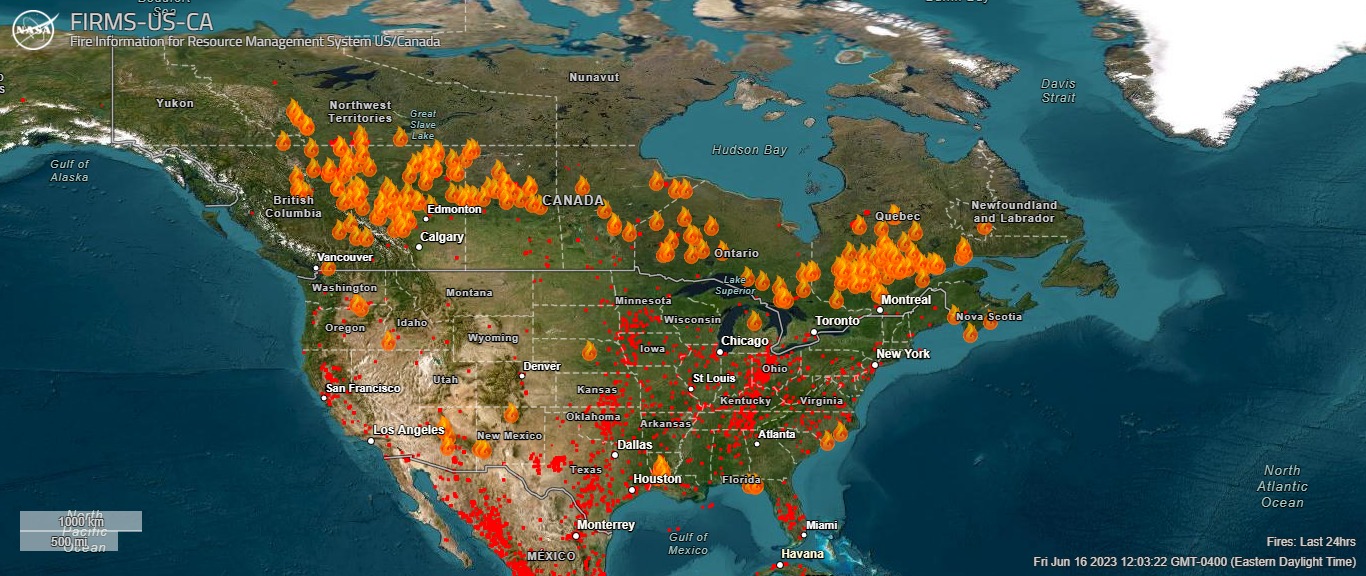Blog

#bioPGH Blog: Smoky ‘Burgh
 A resource of Biophilia: Pittsburgh, #bioPGH is a weekly blog and social media series that aims to encourage both children and adults to reconnect with nature and enjoy what each of our distinctive seasons has to offer.
A resource of Biophilia: Pittsburgh, #bioPGH is a weekly blog and social media series that aims to encourage both children and adults to reconnect with nature and enjoy what each of our distinctive seasons has to offer.
My goodness indeed, folks! Pittsburgh is no stranger to air quality issues, but the last few weeks have brought a sweep of new concerns across the US Northeast: wildfire smoke. If you check out the map below (map image captured on 16 June 2023) you can certainly see why.

Note: The embers on the image are not to scale with the size or intensity of the fires; they only reflect locations. Source: NASA
On the map above, each ember icon represents a wildfire. The combined intensity created hazes of smoke that tinged the Pittsburgh skies as well as places like New York City, as you can see in the National Weather Service’s eerie time-lapse video below. Beyond the aesthetics, the fine particulate matter can be dangerous for anyone, but especially for those with compromised lungs, children, the elderly or those with other health issues.
Check out this almost unbelievable time-lapse of wildfire smoke consuming the World Trade Center and the New York City skyline.
— NWS New York NY (@NWSNewYorkNY) June 7, 2023
Those vulnerable to poor air quality, including seniors and young children, should limit time outdoors if possible.
More: https://t.co/ChRuWv7X6E pic.twitter.com/mtKtLun8lN
Of course, fire is an important part of many habitat types, an expected natural event, and some plants even depend on fire to release seeds. (Fire ecology is actually a fascinating subject, if you ever want to go down a nerdy rabbit hole.) However, the issue with the current wildfires is that their normal patterns are being exacerbated by the effects of climate change. Canada has recently experienced record heat and drought, adding fuel to their typical May-October wildfire season. Droughts, extended dry seasons, high temperatures and changing wind patterns act together to increase the risk and impacts of wildfire seasons, which are lasting longer each year. Fire ecologists and climate scientists have predicted a future increase in the intensity of wildfires since at least the 1990’s, if not earlier, and if left unchecked, these cycles of wildfires could continue to worsen as the effects of climate change become more evident. Of course, we know we can’t look at any single event and say for sure “climate change caused this exact event,” but we can certainly look at patterns over time and notice that patterns are changing.
However, the good news is that we are not helpless in this situation! We can still act to slow climate change. It will take all of us working together, but if the past few years should have shown us anything else, it’s that we humans can be strong and resilient in tough times — and we can accomplish great things when we set our minds to it!
If you’re just getting started on the climate journey, welcome! The suggestions below are all great ways to get started taking action about climate change.
Remember the Power in Numbers
First and foremost, remember that if you are concerned about climate change, you are not alone. Even though climate conversations seem controversial when we listen to politicians or political pundits on TV, the science is not controversial at all. A massive study in 2021 found that over 99% of scientific literature points to the climate as changing and the source of the change as human activity. In addition, a comprehensive study between Yale University and George Mason University found that 70% of Americans are at least concerned (if not alarmed) about climate change and only 22% are doubtful or dismissive, while the remaining 7% are disengaged from the subject. Thus, in essence, we know climate change is happening, we know it’s reality, we know it’s science; but fear of sounding controversial or “political” keeps many of us quiet and feeling isolated. So never fear, folks, we’re in this together!
Keep Learning
Knowledge is power, and with a complicated issue like climate change, it can be intimidating. NASA and NOAA both have helpful education materials available online, but for more in-depth reading, check out the works of Dr. Katherine Hayhoe, Dr. Michael E. Mann and Pittsburgh’s own Dr. Patricia DeMarco. PBS also has a great collection of materials online and through their app to continue learning about climate change, and the Smithsonian has some climate education teaching materials online.
Get Involved
Here in Pittsburgh, a number of non-profits are actively addressing the issue of climate change through various routes, whether it be education, advocacy, policy, etc. You can get involved with an organization that fits your engagement preferences and put your unique skills to work for an important cause.
Get the Word Out
Don’t forget your voice has power! We can all have a major impact by talking about the issue — speak up on social media, bring it up in community meetings, send emails and hand-written letters to your elected officials and keep climate change in conversation. Another huge thing you can do is be a voice of encouragement. When you see someone taking action, let them know you see it and applaud them.
Eat Fresh, Eat Green, Eat Local
Try swapping just a few meals with meat per week for meals that are plant-based. Meat-based diets are resource-heavy because of the energy it takes to grow and raise animals — we could technically consume that energy directly ourselves and skip the “middleman.” And right now our local farmers markets are in full swing so it’s a great opportunity to eat fresh, local produce. An important note about this: don’t worry about marketing myths from years past — you can mindfully consume even an entirely plant-based diet and still receive all of the proper nutrients and proteins that you require. A healthy diet just requires balance.
Buy Less, Buy Better and Brainstorm Reuse
Fast-fashion, discarded electronics and other unwanted materials are problematic on their own since they are likely to end up in a landfill either here or somewhere abroad, but production and transportation of consumer goods is another major issue in the fight against climate change. One way around this is to be intentional in our shopping — avoid just cluttering "stuff" and choose products that are made in the U.S. and choose products that are meant to last. There is usually a trade-off here since higher quality goods are more expensive, but when possible, opting for one well-made shirt rather than multiple flimsy ones is the better choice for fighting climate change. And when you're finished with a good, watch out for “wish-cycling.” We often hope that donating clothes, toys and equipment that we no longer want will keep those items in circulation longer, but we often donate things that cannot be reused. Keep in mind what really can and cannot be recycled and plan your purchase power accordingly.
Easy Changes for Big Impact
Making a difference at home right now is easier than you may think. Get started today with these suggestions specially prepared for you by our Phipps staff.
Make the Switch at Phipps
On weekdays from 11:30 a.m. to close, and all day on weekends, you can stop by a station in our Tropical Forest Conservatory or Tropical Fruit and Spice Room where you can switch your home electricity generator to 100% renewable power right on the spot. As our special thanks to you for this powerful action, if you’re not yet a Phipps member, you’ll be given a free one-year membership at our Family/Household level, and if you’re already a member, you’ll receive a six-month extension at your current level.
Deeper Dive
If you’re looking for detailed deeper dives that do the research and show their receipts, check out Project Drawdown. This resource breaks down contributions to climate change by sector, and both their book and the website are helpful guides to meaningful action. You can also calculate your carbon footprint here, and further map out ways to reduce that footprint.
The wildfires are admittedly terrifying, but I am still optimistic. Pittsburghers have shown themselves to be resilient and adaptable — I have every confidence we could set an example for the rest of the country and the world. Y’inz with me?!
Continue the Conversation: Share your nature discoveries with our community by posting to Twitter and Instagram with hashtag #bioPGH, and R.S.V.P. to attend our next Biophilia: Pittsburgh meeting.
Image Credits: Cover, NASA Worldview, set to cloud cover view on the date of 9 June 2023.

